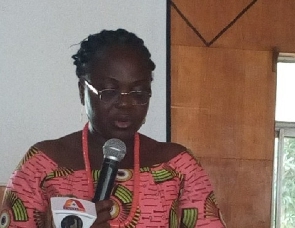The Bono Regional Minister, Justina Owusu Banahene, is appealing to the youth to take agriculture as a business to serve as security for their economic survival and development.
She has also appealed to traditional rulers and landowners to release large tracts of land to the youth in their communities for farming purposes.
Ms. Owusu Banahene said youth groups interested in farming as a business have not been encouraged to do so due to difficulty in accessing land adding; "access to land has also deterred investors from going into large-scale commercial farming".
Whiles presenting 9 Rice harvesters to 3 rice farming groups at Atronie, a farming Community in the Sunyani Municipality, said the youth, especially those at the forest zone enclave should be encouraged to take up farming as a profession to help reduce the rural-urban migration and its Socio-Economic consequences.
She further opined that farming is a lucrative business and called on the teeming unemployed youth to take advantage of the Planting for Food and Jobs and engage in commercial farming to enhance their socio-economic livelihoods.
Three Rice farming-groups applied for the machines through the Ministry of Food and Agriculture to help expand their economic activities.
The Regional Minister, who doubles as the Acting Municipal Chief Executive for Sunyani Municipal Assembly, bemoaned the unfortunate situation where the youth usually drift to the urban centres in search of non - existing white colour jobs only to end up in all manner of social vices which sometimes destroy their future.
She said farming may seem difficult from the onset, especially when one considers our land tenure system and the difficulties in securing a start - up capital but it is preferable to the numerous socio-economic problems that the youth go through in the urban areas.
Ms Owusu Banahene said Ghanaians must support local farmers by consuming produce in a bid to boost self-sufficiency.
She added that the success of government’s efforts in ensuring self-sufficiency in rice production depends largely on the level of consumption of local rice.
She said her desire to encourage Ghanaians to patronise the local product is to support local rice farmers who have been suffering due to the low patronage of their rice.
“It is unacceptable that rice could be cultivated in many parts of the country and yet we refuse to consume it and rather channel our meagre foreign exchange resources to import rice.” She noted.
She intimated that “it is time for all of us to change our attitude towards local food products and consume what we grow in order to support not only the farmers but also grow the agricultural sector”.
Ms Justina Owusu Banahene said there can be no excuse for lack of food in Ghana when we have refused to consume food produced locally and support farmers to increase production.
She also encouraged the beneficiary groups to remain united, open up to other farmers and ensure proper maintenance and use of the machines so as to merit more juicy and lucrative packages that may follow later.
The beneficiary groups were Success Women Rice Association, Twere Nyame Women Rice Association and Amama Mma Rice Group.
Regional News of Wednesday, 2 June 2021
Source: Seth Opoku Agyemang-Atronie, Contibutor













